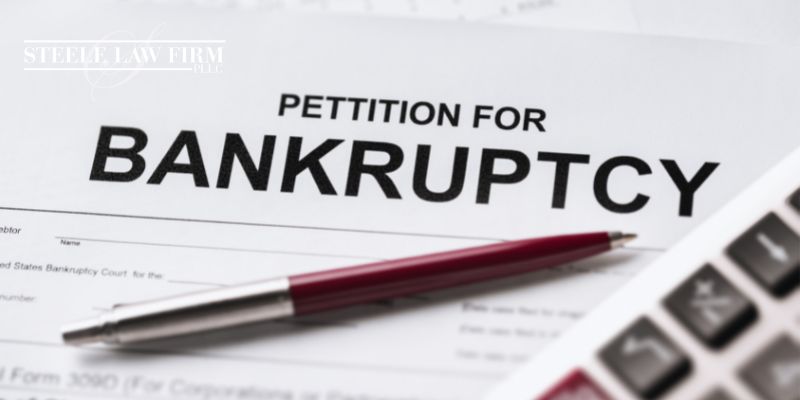Many people aim to live within their means. They plan out large purchases well in advance, their debts are managed reasonably, and they pay their bills on time. Despite your efforts, however, living within your means is not always feasible. Many people face debt that seems insurmountable due to the loss of a job, unexpected medical expenses, and many other factors.
Facing a significant amount of debt can be scary, stressful, and overwhelming. Supporting yourself and your loved ones is important, but it can feel impossible because you cannot overcome your debts. Filing for bankruptcy may be a good option if you find yourself in that situation. It will allow you to minimize or eliminate your major debts so your family can become financially stable again. Understanding all your options when filing for bankruptcy is essential. The team at Steele Law Firm, PLLC, is here to help.

Most people will face financial challenges or strain during their lives. Significant debt that is not sustainable can be brought on by losing a job or incurring unexpected medical debt, as well as other expenses. It may be helpful to file for bankruptcy if you find yourself in these circumstances.
Federal bankruptcy laws were established as a means of protection. They aid businesses and individuals who have found themselves with more debt than they can reasonably pay. The laws provide a way for these individuals and businesses to pay back as much of their debts as they are able and re-establish their financial stability. When you file for bankruptcy, you can either:
Many people choose bankruptcy because it allows them to create their own financial freedom over a certain period of time. Bankruptcy is not always the right choice for those with major debt, but it can be a good option for many.
Many circumstances can determine an individual’s or a business’s need to file for bankruptcy. A significant change in circumstances, such as the loss of a major income, can create a serious amount of debt. Filing for bankruptcy is often the right choice for those whose debt has become overwhelming and unmanageable. Many people are afraid of the stigma associated with filing for bankruptcy, but it can be an avenue to freedom for others.
When someone files for bankruptcy, either as an individual or as a business, it does not automatically indicate that they are irresponsible with their money. It is often the result of the unexpected changes of life, and they are choosing the path that will help them regain stability. There are several filing options available. It is important to know which fits your circumstances so that you can get as much relief as possible.
There are multiple sections within the bankruptcy code, and each one is considered an individual chapter. Each chapter represents a different type of bankruptcy filing. Knowing the various chapters can help you navigate your own bankruptcy filing because you will understand the process better.
There are six primary types of bankruptcy, which are:
Many of the various bankruptcy chapters are only used in very specific cases, such as Chapter 12 for family farmers. Each chapter has a set of specific criteria that must be met. Chapters 7 and 13 are most commonly used for individuals who file for bankruptcy. If filing for bankruptcy is the next step for you and your family, then it is important that you understand the specifics of each chapter.
One of the most common bankruptcy chapters for individuals is Chapter 7, liquidation. It is also referred to as a straight bankruptcy in some cases. Part of the initial filing for Chapter 7 bankruptcy is a list of all your assets. This list provides the courts with an idea of what assets you have that can be liquidated to pay debts. This will determine how your case will proceed.
Filing for Chapter 7 has several key benefits. If your filing is successful, it can:
This means that you will be free of any legal obligation to pay those debts back. While Chapter 7 is an effective method for many, it is not the only type of bankruptcy available.
The other bankruptcy chapter that is common for individuals is Chapter 13. This is often only a good option for those who have a steady income that will allow them to make regular payments. Chapter 13 still requires that some or all of your debts be repaid. A payment plan will be created to help you repay the required debts within three to five years.
Income such as retirement, wages, social security, and disability may all be used to help you repay these debts. If there are any criminal charges connected with you, this chapter will not be of assistance. It also does not apply to debts gathered after you have filed. It does, however, keep creditors at bay and help you reorganize your finances to ensure you can make your payments.
An experienced Saginaw bankruptcy attorney can help guide you through the process and help you get back on your feet. Contact the team at Steele Law Firm, PLLC, for all your bankruptcy needs.